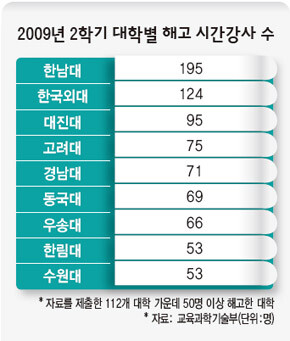hankyoreh
Links to other country sites 다른 나라 사이트 링크
Part-time lecturer dismissals continue at universities

Education ministry statistics show more than one thousand part-time lecturers at 112 universities nationwide have been dismissed this autumn semester seemingly as a result of the Irregular Worker Law that requires employers to move irregular workers into regular positions after two years. This has been met by growing calls for a system-wide solution of restoring part-time university lecturers to their teaching positions.
According to data on the situation of dismissals among part-time lecturers received Wednesday from the Ministry of Education, Science and Technology by Democratic Party Lawmaker Kim Jin-pyo, a total of 1,219 dismissed part-time lecturers were reported by the 112 universities that had recently submitted data. Since these figures represent only slightly more than half the 200 universities nationwide, including education and polytechnic universities, the total number of dismissed lecturers is expected to reach several thousand. The remaining 88 universities have delayed submitting data for almost a month. Among the universities that submitted data, Hannam University appears to have dismissed the largest number of lecturers at 195, followed by the Hankuk University of Foreign Studies at 124, and Daejin University at 75. Based on university type, the 80 private universities that reported data dismissed a far larger number of lecturers at 1,208, while the 32 national and public universities dismissed only eleven.
The dismissed lecturers represent those instructors who had lectured for four consecutive semesters prior to this fall term, but who do not possess doctoral degrees. Since they have been lecturing for the past two years, the required shift of irregular workers to regular positions applied in their cases. The Irregular Worker Law does not apply to those with doctoral degrees, as they are classified as specialists.
Observers are criticizing the dismissals as a “unilateral measure” taken by universities in a situation where the status of these lecturers is uncertain. “All the problems originate from the fact that a part-time lecturer has the effective status of an instructor at a university, giving lectures and evaluating students, but is not considered a member of the teaching staff,” said Pai Chai University Law Professor Kim Jong-seo.
Some of the dismissed lecturers are claiming that their status as workers was never properly guaranteed, let alone their status as teaching staff. In other words, they fall into a legal blind spot. “Part-time lecturers do not sign employment contracts and they do not receive the four major types of insurance, so they are not even recognized as workers,” says Kim Young-kon, the Korea University chapter head for the Korean Irregular Professors Union, who was fired from Korea University this semester. “It is deceptive to use the Irregular Worker Law as an excuse to fire people without putting any measures in place,” Kim suggests.
Other observers are commenting on the need to find a fundamental solution that makes the status of part-time lecturers clear. Ewha Womans University law Professor Do Jae-hyung says, “If you look at the Irregular Worker Act, there are stipulations where you could make application an exception for some persons if they are covered by another law.” “We need an alternative that clarifies the status of part-time lecturers through the Higher Education Act and Private School Act,” Do added.
Kim Dong-ae, head of the Central Struggle Committee for Restoration of University Teacher Status of University Lecturers and Normalization of University Education, emphasized, “Given that it is an issue closely connected with the quality of education received by university students, the issue of the treatment of part-time lecturers requires a fundamental solution such as the amendment of related laws.”
Please direct questions or comments to [englishhani@hani.co.kr]
Editorial・opinion
![[Guest essay] The real reason Korea’s new right wants to dub Rhee a founding father [Guest essay] The real reason Korea’s new right wants to dub Rhee a founding father](https://flexible.img.hani.co.kr/flexible/normal/500/300/imgdb/original/2024/0423/8317138574257878.jpg) [Guest essay] The real reason Korea’s new right wants to dub Rhee a founding father
[Guest essay] The real reason Korea’s new right wants to dub Rhee a founding father![[Column] ‘Choson’: Is it time we start referring to N. Korea in its own terms? [Column] ‘Choson’: Is it time we start referring to N. Korea in its own terms?](https://flexible.img.hani.co.kr/flexible/normal/500/300/imgdb/original/2024/0423/3617138579390322.jpg) [Column] ‘Choson’: Is it time we start referring to N. Korea in its own terms?
[Column] ‘Choson’: Is it time we start referring to N. Korea in its own terms?- [Editorial] Japan’s rewriting of history with Korea has gone too far
- [Column] The president’s questionable capacity for dialogue
- [Column] Are chaebol firms just pizza pies for families to divvy up as they please?
- [Column] Has Korea, too, crossed the Rubicon on China?
- [Correspondent’s column] In Japan’s alliance with US, echoes of its past alliances with UK
- [Editorial] Does Yoon think the Korean public is wrong?
- [Editorial] As it bolsters its alliance with US, Japan must be accountable for past
- [Guest essay] Amending the Constitution is Yoon’s key to leaving office in public’s good graces
Most viewed articles
- 1[Guest essay] The real reason Korea’s new right wants to dub Rhee a founding father
- 2Senior doctors cut hours, prepare to resign as government refuses to scrap medical reform plan
- 3[Column] ‘Choson’: Is it time we start referring to N. Korea in its own terms?
- 4Why Korea shouldn’t welcome Japan’s newly beefed up defense cooperation with US
- 5Terry Anderson, AP reporter who informed world of massacre in Gwangju, dies at 76
- 6New AI-based translation tools make their way into everyday life in Korea
- 7[Column] The clock is ticking for Korea’s first lady
- 8Opposition calls Yoon’s chief of staff appointment a ‘slap in the face’
- 9[Editorial] Japan’s rewriting of history with Korea has gone too far
- 10Korean government’s compromise plan for medical reform swiftly rejected by doctors